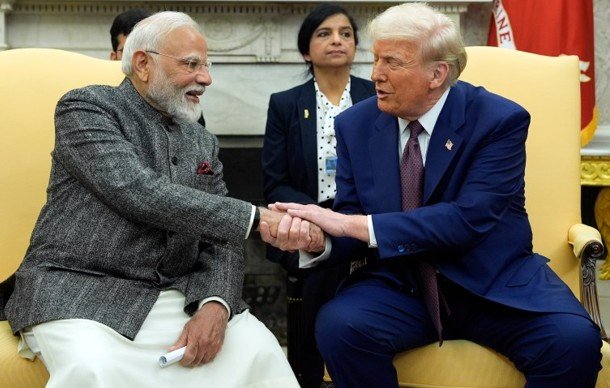U.S. President Donald Trump has indicated that Washington may take a backseat in addressing Bangladesh’s ongoing political crisis, saying, “I’ll leave Bangladesh to PM Modi.”
Speaking at a joint press conference with Indian Prime Minister Narendra Modi at the White House, Trump’s comment signaled a potential shift in U.S. policy, suggesting that Bangladesh’s fate may now be viewed through India’s strategic lens.
His remark comes at a time when Bangladesh is grappling with political unrest, a deteriorating security situation, and accusations of growing state-backed extremism under its interim government.
A Year of Unrest in Bangladesh
The crisis in Bangladesh erupted in August last year, when weeks of student-led protests forced Prime Minister Sheikh Hasina to flee to neighboring India. The demonstrations, which later spiraled into violent clashes, led to the toppling of her government.
In the wake of her departure, the military installed a caretaker administration led by Nobel laureate Muhammad Yunus. While the interim government has promised general elections by December 2025, critics argue that it lacks legitimacy, and concerns over political repression and extremist influence continue to mount.
The situation has left Washington facing a diplomatic dilemma. Under the Biden administration, the U.S. had initially expressed support for the change in government. However, the worsening law and order situation, coupled with concerns from India, has led to renewed scrutiny of the decision.
U.S.-India Friction Over Bangladesh
Bangladesh’s political transition has become a contentious issue between Washington and New Delhi. India had maintained strong ties with Hasina’s government, viewing her as a key ally in countering Islamist extremism in the region.
New Delhi has expressed unease over the rise of the interim administration, which it believes has links to Islamist factions. Indian security officials fear that Bangladesh’s political instability could destabilize the region, leading to an influx of militant groups across its border.
The new government, led by 84-year-old Yunus, has also attracted criticism for its historical political ties. Yunus, who publicly described Trump’s 2016 election victory as a “black day”, has long been associated with former U.S. President Bill Clinton. His 2006 Nobel Peace Prize was awarded following a campaign by Clinton—an acknowledgment later confirmed by the Norwegian Nobel Committee.
At the same time, billionaire philanthropist Alex Soros, a vocal Trump critic, has thrown his weight behind the Yunus-led government. Soros, who has vowed to “fight back” against Trump, has met with Yunus twice in recent months, including a private jet trip to Bangladesh amid escalating unrest.
Bangladesh’s Deepening Crisis
The Yunus government has struggled to contain violence and lawlessness, with opposition groups accusing it of mass arrests, extrajudicial killings, and targeting of minorities. A controversial crackdown, known as ‘Operation Devil Haunt,’ has led to thousands of detentions, with rights groups alleging widespread abuses.
Public anger spilled onto the streets last week when regime-backed mobs launched a wave of attacks across Bangladesh, setting fire to properties and destroying historical sites. Among the most shocking incidents was the demolition of the national memorial to Sheikh Mujibur Rahman, Bangladesh’s founding leader.
The site, which served as a museum commemorating Bangladesh’s independence, was ransacked by rioters. When initial attempts to set it ablaze failed, attackers used excavators to tear it down over two days, while Islamist groups celebrated at the scene.
Rising Extremism and Economic Decline
The violence has raised concerns about the growing influence of radical groups. Under the interim administration, banned Islamist organizations have re-emerged, with reports of militants being freed from prison. Some extremist factions, such as Hizb ut-Tahrir, which is outlawed in several Western countries, are now openly operating in Bangladesh.
Amid the political turmoil, the country’s economy is in freefall. Once hailed as an emerging economic powerhouse, Bangladesh is now facing declining foreign reserves, a sharp rise in debt, and a plummeting currency. Observers warn that, without urgent reforms, the country may require international bailouts in the coming months.
The situation has drawn international condemnation, with Trump himself taking to social media to denounce the violence.
“I strongly condemn the barbaric attacks on Hindus, Christians, and other minorities in Bangladesh,” he posted, adding that the country “remains in a total state of chaos.”
Regional Concerns
Bangladesh’s instability has broader security implications, particularly for India, which shares a long and porous border with its neighbor. Officials in New Delhi fear that the unrest could lead to increased militant activity in the region, with India already home to millions of undocumented Bangladeshis.
Concerned about potential infiltration by extremists, India has begun tightening border security. However, analysts argue that a lasting solution will require coordinated action between Washington and New Delhi.
As Trump seeks to repair U.S.-India relations, a policy shift on Bangladesh could be on the horizon. The Biden administration’s initial approach, which was seen as lenient toward the new regime, had caused tension with India. Now, with Trump in office, a recalibrated U.S. strategy could pave the way for a more stable and cooperative regional partnership.
As Bangladesh continues to teeter on the brink of deeper unrest, the world will be watching whether a Trump-Modi alliance can help restore stability—or if the crisis will spiral even further out of control.


